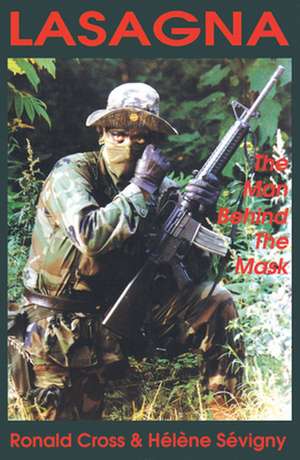Lasagna: The Man Behind the Mask
Autor Ronald Cross, Hélène Sévignyen Limba Engleză Paperback – 31 dec 1993
The events at Oka in 1990 saw the might of the Canadian Armed Forces in the service of the governments of both Quebec and Canada confront some 40 armed Mohawk “Warriors” who were defending their local community’s resistance against a further colonial encroachment on their native lands. The events of that summer have etched themselves indelibly into the minds of North Americans as the latest episode in the continuing 500-year history of “Indian wars” in the Americas.
To the Mohawk nation, a community spanning a territory crossed by the Canada-USA boundary, the confrontation at Oka was simply a temporary open declaration of war by Canada in what Mohawks regard as an ongoing cold war between their nation, and the colonial powers of both Canada and the USA. As in all previous “Indian wars” instantly mythologized by the colonial North American media, the defenders of the community at Oka were presented to North American news consumers as “a criminal element,” terrorizing (with their “Viet Nam military training” and their “Mafia connections”) not only “law abiding citizens,” but their own people as well.
The day after the military stand-off at Oka ended, “Lasagna,” one of the leaders of the Mohawks’ armed resistance, was “unmasked” as Ronald Cross—a man with no criminal record, no connections to the Mafia or any other “criminal underground,” and no military service record in Viet Nam or any other country in the world. Where, then, had these “common knowledge” rumours originated? And why was there such a high degree of media complicity in the “public information strategies” of the governments of Quebec, Canada and the USA ? Where, indeed, did the inflammatory media tag “Warriors” come from, when the closest word in the Mohawk language defining such a concept means, simply and literally, “the men of the community”?
These
To the Mohawk nation, a community spanning a territory crossed by the Canada-USA boundary, the confrontation at Oka was simply a temporary open declaration of war by Canada in what Mohawks regard as an ongoing cold war between their nation, and the colonial powers of both Canada and the USA. As in all previous “Indian wars” instantly mythologized by the colonial North American media, the defenders of the community at Oka were presented to North American news consumers as “a criminal element,” terrorizing (with their “Viet Nam military training” and their “Mafia connections”) not only “law abiding citizens,” but their own people as well.
The day after the military stand-off at Oka ended, “Lasagna,” one of the leaders of the Mohawks’ armed resistance, was “unmasked” as Ronald Cross—a man with no criminal record, no connections to the Mafia or any other “criminal underground,” and no military service record in Viet Nam or any other country in the world. Where, then, had these “common knowledge” rumours originated? And why was there such a high degree of media complicity in the “public information strategies” of the governments of Quebec, Canada and the USA ? Where, indeed, did the inflammatory media tag “Warriors” come from, when the closest word in the Mohawk language defining such a concept means, simply and literally, “the men of the community”?
These
Preț: 68.03 lei
Preț vechi: 84.01 lei
-19% Nou
Puncte Express: 102
Preț estimativ în valută:
13.02€ • 13.92$ • 10.85£
13.02€ • 13.92$ • 10.85£
Carte indisponibilă temporar
Doresc să fiu notificat când acest titlu va fi disponibil:
Se trimite...
Preluare comenzi: 021 569.72.76
Specificații
ISBN-13: 9780889223486
ISBN-10: 0889223483
Pagini: 248
Dimensiuni: 152 x 228 x 18 mm
Greutate: 0.47 kg
Ediția:NONE
Editura: Talon Books
Colecția Talonbooks
Locul publicării:Canada
ISBN-10: 0889223483
Pagini: 248
Dimensiuni: 152 x 228 x 18 mm
Greutate: 0.47 kg
Ediția:NONE
Editura: Talon Books
Colecția Talonbooks
Locul publicării:Canada
Recenzii
"The book’s 248 pages are, to put it simply, credible. Read this book—it will open your eyes too."
— Alberta Native News
— Alberta Native News
Notă biografică
Ronald Cross
Ronald Cross is a Mohawk whose Italian heritage led to his being nick-named “Lasagna.” He was active in the Oka crisis, during which his image was seized upon by the media and became a symbol of the confrontation between the Mohawks and the Canadian and Quebec authorities. For Lasagna: The Man Behind the Mask (1994), Ronald Cross has contributed additional information that brings the reader up to date on the situation in the Mohawk community, and on the Mohawks’ relationship with the neighbouring non-native communities in both Canada and the United States.
Hélène Sévigny
Ronald Cross is a Mohawk whose Italian heritage led to his being nick-named “Lasagna.” He was active in the Oka crisis, during which his image was seized upon by the media and became a symbol of the confrontation between the Mohawks and the Canadian and Quebec authorities. For Lasagna: The Man Behind the Mask (1994), Ronald Cross has contributed additional information that brings the reader up to date on the situation in the Mohawk community, and on the Mohawks’ relationship with the neighbouring non-native communities in both Canada and the United States.
Hélène Sévigny
Descriere
A biography of the most notorious of the 1990 Oka warriors.
